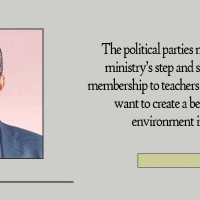- Tuesday, 30 April 2024
Ensure Safety Of War Reporters
Truth telling is always associated with risks and challenges, and journalists face this every day. War journalism is essential for truth-telling and uncovering hidden facts. Journalists have risked their lives covering wars and doing their duty of informing the public whenever there have been wars. Through journalists understanding of global conflicts become possible for the global public. It is therefore important to recognise their work and equally important to protect them during risky situations when they need to go to collect information.
Currently, the world is witnessing a series of wars where innocent people are being killed in the power struggle of countries and their leaders. The conflict between Israel and Hamas has been ongoing for seven months now. Journalists carrying out their work in the region have been facing unparalleled challenges. According to the Committee to Protect Journalists (CPJ), as of April 9th, 2024, preliminary investigation has shown that at least 95 journalists and media workers were among the more than 34,000 estimated killed since the conflict began on October 7, 2023, with more than 33,000 Palestinian deaths in Gaza and the West Bank and 1,200 deaths in Israel.
Personal security
Reporters on the ground covering this war are faced with risks to their personal security every moment of their work assignment. They are also faced with logistical obstacles like lack of internet facilities and the ability to move around freely. The other aspect of collecting information in today’s digital age is being bombarded with a tsunami of disinformation and dubious narratives. Fact-checking such information at times become a herculean task. Due to severe personal risks, there is a near to impossible working environment in Gaza.
Most investigative stories thus have been produced by international media outlets based on geolocation, analysis of documents, information from open sources and bloggers’ blogs together with whatever information received via citizens based in Gaza. On-the-ground reporting has been very difficult and impossible for many journalists. According to the Writing Across Contexts site, over 2,000 journalists have been killed since 1997, averaging more than 75 deaths per year. War zones are always dangerous environments for journalists as they face the danger of being hunted by terrorists, governments, and at times mistakenly killed by their own country citizens.
Reaching the spot of conflict to collect accurate news becomes more challenging due to security factors, censorship, and government restrictions. As a result, factual reporting becomes very difficult. War zones and the facts that emerge while reporting can be very traumatic for journalists. Witnessing the violence that they are reporting first-hand, seeing the destruction that is resulted due to war and mainly the human suffering they witness while reporting can take serious tolls on journalists’ mental and emotional well-being. This increases trauma and stress in them. As a result, it is important to understand that not only physical but mental health issues of journalists are also at risk of being impacted adversely while covering conflict situations.
The media sector has been impacted negatively since the COVID-19 pandemic. Wars that are ongoing currently have not helped the media houses or freelance journalists. According to the Centre for Media Data and Society, many journalists expect a fall in advertising revenue due to war. Media houses could also face financial strain which could lead to their closure. During the ongoing war in the Middle East and Ukraine, there have been reports of this actually happening. During war, governments tend to exert more restrictions and control over media and propaganda outlets could be spread around to influence public opinion. This is one big challenge that professional journalists face during war and has been seen very often during the Russia-Ukraine war and the Israel-Hamas war among others.
There have been ample examples of journalists who write critical views and fact being attacked by governments who want to prevent them from doing so. Today’s generation is witness to the fact that journalists reporting on war crimes and conflict mismanagement journalists have ensured accountability and justice. Fact-checking the information that is rampant in the digital media and collecting information from the field has been a herculean task but there are brave and commendable work that journalists are doing today to inform the world of what is actually happening in the war and conflict zones.
They need to counter propaganda and misinformation that are released to foster empathy by governments or terrorists for their own interests. According to the Harvard Gazette, Dorothy Thompson is an American journalist who was a foreign correspondent in Central Europe. Thompson was the first American journalist expelled from Nazi Germany for her reporting. She later became an influential anti-fascist voice in the USA. There are several such examples of brave journalists who have risked their lives to cover war and conflict zones. Lyse Doucet with BBC is one such example who has relentlessly covered Afghanistan, Middle East among other war and conflict Zones.
As we approach World Press Freedom Day on May 3rd, it is essential to recognise the invaluable contributions of journalists operating in conflict zones and to reaffirm our commitment to protecting press freedom and the safety of journalists worldwide. Supporting independent journalism financially and ensuring the safety and well-being of journalists on the frontlines is paramount. Their courage and dedication serve as a beacon of hope amidst the darkness of war, reminding us of the enduring power of truth and the indomitable spirit of the human quest for justice and accountability.
(Sharma is a senior journalist and women's rights advocate namrata1964@yahoo.com. Twitter handle: @NamrataSharmaP)















